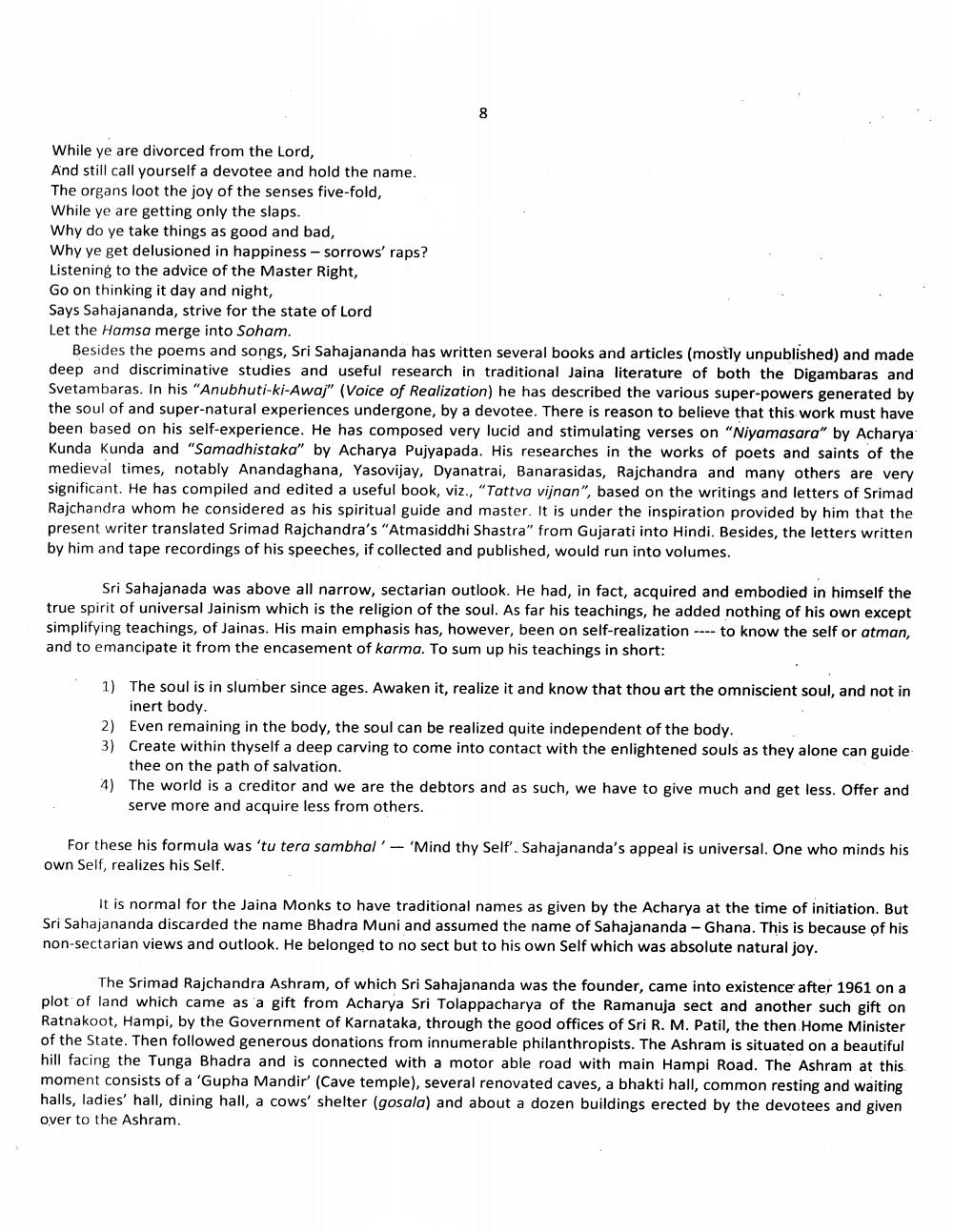Book Title: Jainism Abroad Author(s): Pratap J Tolia Publisher: Vardhaman Bharati International Foundation View full book textPage 9
________________ While ye are divorced from the Lord, And still call yourself a devotee and hold the name. The organs loot the joy of the senses five-fold, While ye are getting only the slaps. Why do ye take things as good and bad, Why ye get delusioned in happiness - sorrows' raps? Listening to the advice of the Master Right, Go on thinking it day and night, Says Sahajananda, strive for the state of Lord Let the Hamsa merge into Soham. Besides the poems and songs, Sri Sahajananda has written several books and articles (mostly unpublished) and made deep and discriminative studies and useful research in traditional Jaina literature of both the Digambaras and Svetambaras. In his "Anubhuti-ki-Awaj" (Voice of Realization) he has described the various super-powers generated by the soul of and super-natural experiences undergone, by a devotee. There is reason to believe that this work must have been based on his self-experience. He has composed very lucid and stimulating verses on "Niyamasara" by Acharya Kunda kunda and "Samadhistaka" by Acharya Pujyapada. His researches in the works of poets and saints of the medieval times, notably Anandaghana, Yasovijay, Dyanatrai, Banarasidas, Rajchandra and many others are very significant. He has compiled and edited a useful book, viz., "Tattva vijnan", based on the writings and letters of Srimad Rajchandra whom he considered as his spiritual guide and master. It is under the inspiration provided by him that the present writer translated Srimad Rajchandra's "Atmasiddhi Shastra" from Gujarati into Hindi. Besides, the letters written by him and tape recordings of his speeches, if collected and published, would run into volumes. Sri Sahajanada was above all narrow, sectarian outlook. He had, in fact, acquired and embodied in himself the true spirit of universal Jainism which is the religion of the soul. As far his teachings, he added nothing of his own except simplifying teachings, of Jainas. His main emphasis has, however, been on self-realization --- to know the self or atman, and to emancipate it from the encasement of karma. To sum up his teachings in short: 1) The soul is in slumber since ages. Awaken it, realize it and know that thou art the omniscient soul, and not in inert body. 2) Even remaining in the body, the soul can be realized quite independent of the body. 3) Create within thyself a deep carving to come into contact with the enlightened souls as they alone can guide thee on the path of salvation. 4) The world is a creditor and we are the debtors and as such, we have to give much and get less. Offer and serve more and acquire less from others. For these his formula was 'tu tera sambhal' - 'Mind thy Self'. Sahajananda's appeal is universal. One who minds his own Self, realizes his Self. It is normal for the Jaina Monks to have traditional names as given by the Acharya at the time of initiation. But Sri Sahajananda discarded the name Bhadra Muni and assumed the name of Sahajananda - Ghana. This is because of his non-sectarian views and outlook. He belonged to no sect but to his own Self which was absolute natural joy. The Srimad Rajchandra Ashram, of which Sri Sahajananda was the founder, came into existence after 1961 on a plot of land which came as a gift from Acharya Sri Tolappacharya of the Ramanuja sect and another such gift on Ratnakoot, Hampi, by the Government of Karnataka, through the good offices of Sri R. M. Patil, the then Home Minister of the State. Then followed generous donations from innumerable philanthropists. The Ashram is situated on a beautiful hill facing the Tunga Bhadra and is connected with a motor able road with main Hampi Road. The Ashram at this moment consists of a 'Gupha Mandir' (Cave temple), several renovated caves, a bhakti hall, common resting and waiting halls, ladies' hall, dining hall, a cows' shelter (gosala) and about a dozen buildings erected by the devotees and given over to the Ashram.Page Navigation
1 ... 7 8 9 10 11 12 13 14 15 16 17 18 19 20 21 22 23 24 25 26 27 28 29 30 31 32 33 34 35 36 37 38 39 40 41 42 43 44 45 46 47 48 49 50 51 52 53 54 55 56 57 58
